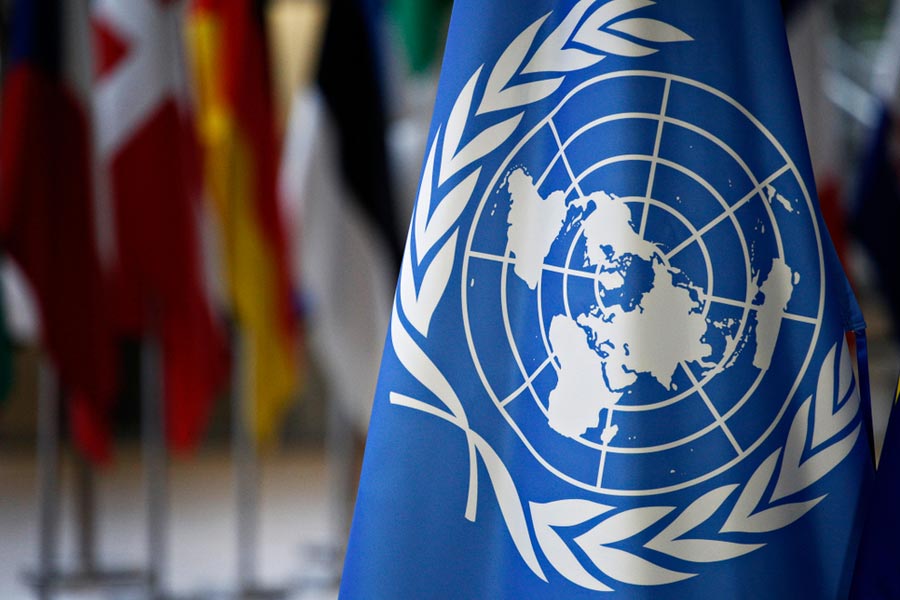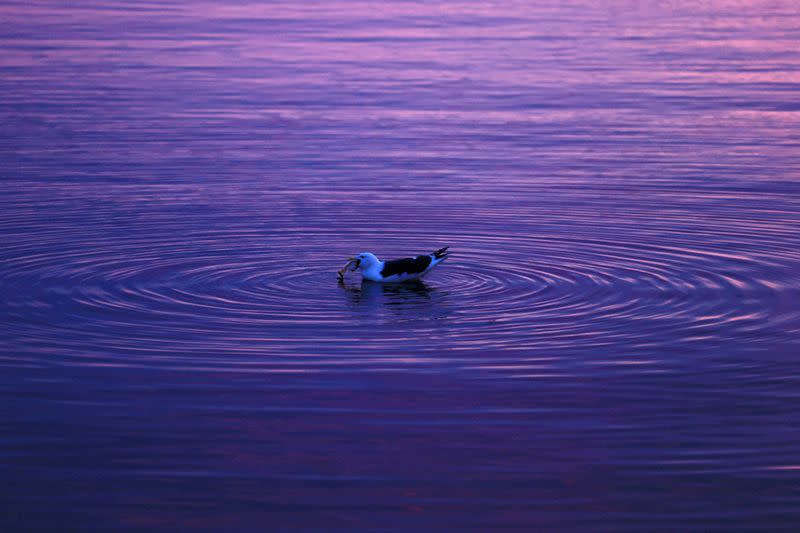Japan is set to receive a report from a United Nations nuclear watchdog on Tuesday approving its plan to release treated radioactive water from the tsunami-wrecked Fukushima plant
Reuters Tokyo Published 04.07.23

Japan is set to receive a report from a UN nuclear watchdog on Tuesday approving its plan to release treated radioactive water from the tsunami-wrecked Fukushima plant into the ocean despite fierce resistance from Beijing and some local opposition.
International Atomic Energy Agency (IAEA) chief Rafael Grossi begins a four-day visit to Japan on Tuesday, when he will meet with Prime Minister Fumio Kishida and deliver the results of the agency's final two-year safety review.
Japan has not specified a date to start the water release, which will take 30 to 40 years to complete, pending the IAEA's review and official approval from the national nuclear regulatory body for Tokyo Electric Power (Tepco). The nuclear regulator's final word could come as early as this week.
Some Japanese fishing unions have opposed the government's plan, conceived in 2021, saying it would undo work to repair their reputations after several countries banned some Japanese food products following the 2011 disaster.
Some neighbouring countries have over the years also complained about the threat to the marine environment and public health, with Beijing emerging as the biggest critic of the plan.
Through its embassy in Japan, Beijing on Tuesday said the IAEA's report cannot be a "pass" for the water release and called for the plan's suspension.
Japan maintains the process is safe as it has treated the water - enough to fill 500 Olympic-sized swimming pools - used to cool the fuel rods of the Fukushima plant after it was damaged by the earthquake and tsunami in 2011.
The water has been filtered to remove most radioactive elements except for tritium, an isotope of hydrogen that is difficult to separate from water. The treated water will be diluted to well below internationally approved levels of tritium before being released into the Pacific Ocean.
In a presentation given to foreign journalists in China last month, Japanese officials said the tritium levels in the water it plans to release are lower than that found in waste water regularly released by nuclear plants around the world, including in China.
The officials said that they had made multiple and repeated attempts to explain the science behind Tokyo's stance to Beijing, but that its offers had been ignored.
China on Tuesday said Japan's comparison of the tritium levels in the treated water and waste water was "completely confusing concepts and misleading public opinion."
IAEA's Grossi will visit the Fukushima plant on Wednesday. After his Japan trip, he is also due to visit South Korea, where consumers have been snapping up sea salt
and other items ahead of the water release.
He is also expected to visit New Zealand and the Cook Islands in a bid to ease concerns over the plan, according to media reports.
IAEA must not endorse Japan's wrongdoings in nuclear-contaminated water disposal: Spokesperson
Xinhua, July 4, 2023
China on Monday urged the International Atomic Energy Agency (IAEA) to come to a responsible conclusion on the ocean discharge of contaminated water from Fukushima, Japan.
Chinese foreign ministry spokesperson Wang Wenbin made the remarks at a regular press briefing when answering a query concerning that IAEA Director General Rafael Grossi will visit Japan starting Tuesday and deliver a report on the safety of discharge of tainted water from the Fukushima nuclear plant, which may give backing for Japan to proceed with the discharge.
Wang said China's opposition to Japan's efforts of pushing through the discharge plan of nuclear-contaminated water into the ocean is consistent, stressing that it is neither ethical nor lawful to spill the risk of nuclear pollution to the rest of the world.
China urges Japan to face up to the legitimate concern of the international community and people in Japan, stop forcibly proceeding with its ocean discharge plan, dispose of the nuclear-contaminated water in a science-based, safe and transparent manner and place itself under the strict monitoring of the international community, the spokesperson said.
China believes that the IAEA should come to a conclusion on the ocean discharge of contaminated water from Fukushima that is responsible and can stand up to the test of history and science, and must not endorse Japan's wrongdoings in the disposal of nuclear-contaminated water, Wang said.
"It is for the maritime environment that we all share, the life and health of all human beings and the only planet that we call home," the spokesperson said.
Xinhua, July 4, 2023
China on Monday urged the International Atomic Energy Agency (IAEA) to come to a responsible conclusion on the ocean discharge of contaminated water from Fukushima, Japan.
Chinese foreign ministry spokesperson Wang Wenbin made the remarks at a regular press briefing when answering a query concerning that IAEA Director General Rafael Grossi will visit Japan starting Tuesday and deliver a report on the safety of discharge of tainted water from the Fukushima nuclear plant, which may give backing for Japan to proceed with the discharge.
Wang said China's opposition to Japan's efforts of pushing through the discharge plan of nuclear-contaminated water into the ocean is consistent, stressing that it is neither ethical nor lawful to spill the risk of nuclear pollution to the rest of the world.
China urges Japan to face up to the legitimate concern of the international community and people in Japan, stop forcibly proceeding with its ocean discharge plan, dispose of the nuclear-contaminated water in a science-based, safe and transparent manner and place itself under the strict monitoring of the international community, the spokesperson said.
China believes that the IAEA should come to a conclusion on the ocean discharge of contaminated water from Fukushima that is responsible and can stand up to the test of history and science, and must not endorse Japan's wrongdoings in the disposal of nuclear-contaminated water, Wang said.
"It is for the maritime environment that we all share, the life and health of all human beings and the only planet that we call home," the spokesperson said.
Explainer-How Japan plans to release Fukushima water into the ocean
Updated July 3, 2023

Updated July 3, 2023

TOKYO (Reuters) -Japan is set to begin pumping out more than a million tonnes of treated water from the destroyed Fukushima Daiichi nuclear power plant this summer, a process that will take decades to complete.
The water was distilled after being contaminated from contact with fuel rods at the reactor, destroyed in a 2011 earthquake. Tanks on the site now hold about 1.3 million tonnes of radioactive water - enough to fill 500 Olympic-sized swimming pools. Here is how Tokyo Electric Power Company (Tepco) plans to deal with the water:
WATER RELEASE
Tepco has been filtering the contaminated water to remove isotopes, leaving only tritium, a radioactive isotope of hydrogen that is hard to separate from water. Tepco will dilute the water until tritium levels fall below regulatory limits before pumping it into the ocean from the coastal site.
Water containing tritium is routinely released from nuclear plants around the world, and regulatory authorities support dealing with the Fukushima water in this way.
Tritium is considered to be relatively harmless because it does not emit enough energy to penetrate human skin. But when ingested it can raise cancer risks, a Scientific American article said in 2014.
The water disposal will take decades to complete, with a rolling filtering and dilution process, alongside the planned decommissioning of the plant.
REACTION TO OCEAN RELEASE
Tepco has been engaging with fishing communities and other stakeholders and is promoting agriculture, fishery and forest products in stores and restaurants to reduce any reputational harm to produce from the area.
Fishing unions in Fukushima have urged the government for years not to release the water, arguing it would undo work to restore the damaged reputation of their fisheries.
Neighbouring countries have also expressed concern. China has been the most vocal, calling Japan's plan irresponsible, unpopular and unilateral.
(Reporting by Tokyo Newsroom. Editing by Gerry Doyle)
The water was distilled after being contaminated from contact with fuel rods at the reactor, destroyed in a 2011 earthquake. Tanks on the site now hold about 1.3 million tonnes of radioactive water - enough to fill 500 Olympic-sized swimming pools. Here is how Tokyo Electric Power Company (Tepco) plans to deal with the water:
WATER RELEASE
Tepco has been filtering the contaminated water to remove isotopes, leaving only tritium, a radioactive isotope of hydrogen that is hard to separate from water. Tepco will dilute the water until tritium levels fall below regulatory limits before pumping it into the ocean from the coastal site.
Water containing tritium is routinely released from nuclear plants around the world, and regulatory authorities support dealing with the Fukushima water in this way.
Tritium is considered to be relatively harmless because it does not emit enough energy to penetrate human skin. But when ingested it can raise cancer risks, a Scientific American article said in 2014.
The water disposal will take decades to complete, with a rolling filtering and dilution process, alongside the planned decommissioning of the plant.
REACTION TO OCEAN RELEASE
Tepco has been engaging with fishing communities and other stakeholders and is promoting agriculture, fishery and forest products in stores and restaurants to reduce any reputational harm to produce from the area.
Fishing unions in Fukushima have urged the government for years not to release the water, arguing it would undo work to restore the damaged reputation of their fisheries.
Neighbouring countries have also expressed concern. China has been the most vocal, calling Japan's plan irresponsible, unpopular and unilateral.
(Reporting by Tokyo Newsroom. Editing by Gerry Doyle)
No comments:
Post a Comment